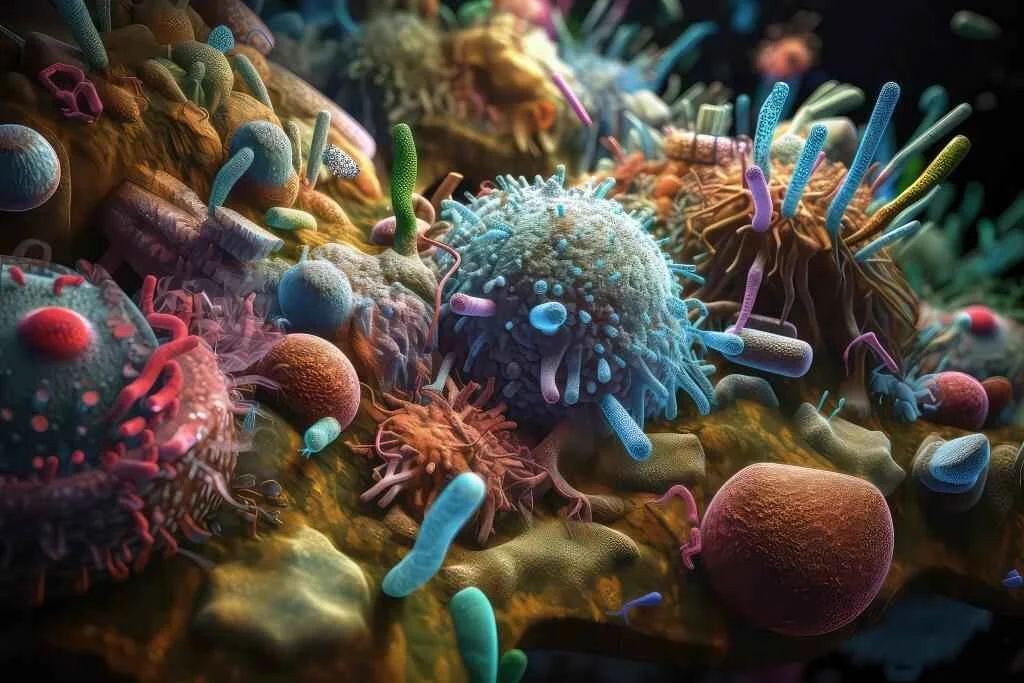Understanding the microbiome: the key to optimal vitamin D levels
Did you know that your gut health plays a crucial role in your body’s ability to absorb vitamin D? Your microbiome, the collection of bacteria and other microorganisms in your gut, can have a significant impact on your overall health and wellbeing. In this guide, we’ll explore the connection between your microbiome and vitamin D absorption, and how you can optimise your gut health for better overall health.
What is the microbiome?
The gut microbiome refers to the collection of microorganisms, including bacteria, viruses, fungi, and other microbes, that live in the digestive tract, from mouth to colon. The average adult male has about 100 trillion microbes in his gut, which is about twice as many human cells in the whole body. These microorganisms play a crucial role in maintaining overall health and wellbeing, from helping with digestion to supporting the immune system and much more.
The microbiome is unique to each individual and factors, such as diet, lifestyle, and environmental exposures, can influence it. Understanding the microbiome is key to optimising overall health and wellbeing.
The role of gut bacteria in vitamin D absorption
Have you heard that the diversity of your gut bacteria can affect your vitamin D levels? Research has shown that certain strains of gut bacteria can help increase the absorption of vitamin D from food and supplements. An imbalance in gut bacteria can lead to decreased absorption and lower levels of vitamin D in the body.
If you’re trying to prevent cancer, this is pretty serious because people with low vitamin D have a higher risk of cancer, as well as osteoporosis, metabolic syndrome (which can lead to diabetes), cardiovascular disease, inflammatory bowel disease, obesity and autoimmune diseases (1).
You’re probably wondering how gut bacteria can alter vitamin D absorption. The bacteria themselves don’t have any effect, but some of them produce short chain fatty acids (SCFA) like butyrate, acetate and propionate, which are known as postbiotics (2).
These short chain fatty acids convert 25(OH)D, which is the compound that the body uses to store vitamin D, into 1,25(OH)2D, which is the active form that the body can use (1).
When you have a blood test for vitamin D, it’s 25(OH)D that they measure. But even if your vitamin D levels are within the normal range, it may not be converting effectively if you don’t have the right gut bacteria to produce those short chain fatty acids.
How to support a healthy microbiome for optimal vitamin D levels
There are several ways of supporting a healthy microbiome to ensure optimal vitamin D levels.
It’s important to focus on eating a balanced diet rich in fibre, which includes whole grains, vegetables, nuts, seeds and fruit. These foods provide prebiotics, which are essential for the growth and maintenance of healthy gut bacteria.
Some of the best prebiotic vegetables are garlic, Jerusalem artichokes, onions, leeks, cabbage, sweet potatoes, jicama, pulses, and coconut.
Fruits that are high in prebiotic fibre include apples, bananas and berries.
Whole grains that are especially good include oats and barley.
Seeds to prioritise are hemp, chia and flaxseed, but all seeds are high in fibre.
Eating probiotic-rich foods like yogurt, kefir, and fermented vegetables like sauerkraut and kimchi also introduces beneficial bacteria into the gut.
If you are or have recently taken antibiotics, it’s worth taking a probiotic for a short time to repopulate the gut. If you’re currently taking antibiotics, leave an hour or two between them and the probiotics, so that you don’t kill the probiotics. I don’t recommend taking really high levels of probiotics, though, as these can upset the balance of the different species in the gut.
Try to keep your BMI in the normal range, which is 18.5—24.9. Research shows that overweight adults have lower vitamin D levels (3). Scientists aren’t sure of the reason for this, but overweight people might have disrupted gut microbiomes because of a poor diet.
Avoid excessive alcohol consumption because this can cause disruption of the gut microbiome (4).
Reducing stress and getting enough sleep also supports a healthy microbiome and improves vitamin D absorption.
Other factors that can affect vitamin D absorption and utilization
There are several other factors besides the microbiome that can affect vitamin D absorption and its use in the body. These include age, skin colour and geographic location.
As we age, our skin becomes less efficient at producing vitamin D from sunlight.
People with darker skin also need more sun exposure to produce the same amount of vitamin D as those with lighter skin.
Where you live is also significant. Vitamin D production is highest when the sun is at its highest point in the sky. So those who live in areas far from the equator are likely to have lower vitamin D levels than those who live close to it. The time of year also affects the amount of vitamin D you’re likely to produce; your vitamin D levels will probably be lower in winter than in summer.
Of course, Vitamin D is not the only nutrient that affects you when you have had cancer. I talk about many more in my book. You can find out more about the book by clicking here. And you can find all the online stores that stock it by clicking the Buy the Book button below.
References
1 Thomas RL, Jiang L, Adams JS, et al. Vitamin D metabolites and the gut microbiome in older men. Nature Communications. 2020;11(1):5997. doi:10.1038/s41467-020-19793-8
2 Tonelli EV, Vo N, Methe B, Morris A, Sowa G. An unexpected connection: A narrative review of the associations between Gut Microbiome and Musculoskeletal pain. European Spine Journal. 2022;31(12):3603-3615. doi:10.1007/s00586-022-07429-y
3 Tobias DK, Luttmann-Gibson H, Mora S, et al. Association of body weight with response to vitamin D supplementation and metabolism. JAMA Network Open. 2023;6(1):e2250681. doi:10.1001/jamanetworkopen.2022.50681
4 Engen PA, Green SJ, Voigt RM, Forsyth CB, Keshavarzian A. The Gastrointestinal Microbiome: Alcohol Effects on the Composition of Intestinal Microbiota. Alcohol Research. 2015;37(2):223-236. https://www.ncbi.nlm.nih.gov/pmc/articles/PMC4590619/. Accessed May 4, 2023.

